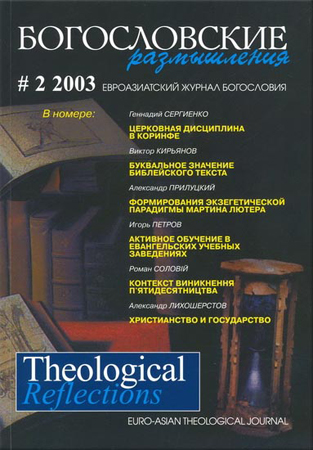Meaning: Is There a Single, Literal Meaning of a Biblical Text That the Interpreter Can Discover?
Keywords:
Literal meaning of a Biblical text, interpreter discover, concerning the meaning of the text, theological circles concerning the subject of meaningAbstract
The purpose of this article is to look critically at different opinions circulating today concerning the meaning of the text. There are always debates in theological circles concerning the subject of meaning. If a meaning exists, how is it found? If a meaning exists, is there just one meaning or many? Three main approaches to defining the meaning of the text are examined: the reader-oriented approach, the writer-oriented approach, and the text-oriented approach. Arguments for and against each approach are given, with the author’s opinion at the end.
References
- Barr, James. “The Literal, Allegorical, and Modern Biblical Scholarship. ”Journal for the Study of the Old Testament 44 (1989): 3-17.
- Barthes, Roland. “From Work to Text.” In Textual Strategies: Perspectives in Poststructuralist Criticism, ed. Josue V. Harrari, 73%81. Ithaca, NY: Cornell University Press, 1979.
- Brown, Raymond. The Sensus Plenior of Sacred Scripture. Baltimore: St. Mary’s University Press, 1995.
- Caird, G.B. The Language and Imagery of the Bible. Grand Rapids: Eerdmans, 1997.
- Cotterell, Peter and Max Turner. Linguistics and Biblical Interpretation. London: SPCK, 1989.
- Croatto, Severino. Biblical Hermeneutics: Toward a Theory of Reading as the Production of Meaning. Maryknoll, NY: Orbis, 1987.
- Fish, Stanley. “Interpreting the Variorum.” In ReaderResponse Criticism, ed. Jane P. Thompkin, 164%184. Baltimore: Johns Hopkins Press, 1980.
- ________. Is There a Text in This Class? The Authority of Interpretative Communities. London and Cambridge: Harvard University Press, 1980.
- Gillespie, Thomas W. “Biblical Authority and Interpretation: The Current Debate on Hermeneutics.” In A Guide to Contemporary Hermeneutics, ed.
- Donald K. McKin. Grand Rapids: Eerdmans, 1986.
- Goldingay, John. Models for Interpretation of Scripture. Grand Rapids: Eerdmans, 1995.
- Hirsch, E.D. Validity in Interpretation. New Haven: Yale University Press, 1967.
- ________. The Aim of Interpretation. Chicago: The University of Chicago Press, 1976.
- Kaiser, Walter C. “The Single Intent of Scripture.” In Evangelical Roots: A Tribute to Wilbur Smith, ed. K.S. Kantzer, 55-69. Nashville: Nelson, 1978.
- Klein, William W. Introduction to Biblical Interpretation. Dallas: Word, 1993.
- LaSor, W.S. “The Sensus Plenior and Biblical Interpretation.” In A Guide to Contemporary Hermeneutics, ed. Donald K.McKim. Grand Rapids, MI: Eerdmans, 1986.
- McKnight, Edgar V. “Reader-Response Criticism.” In To Each Its Own Meaning, ed. Steven McKenzie. Louisville, KY: Westminster/John Knox Press, 1993.
- Osborne, Grant R. The Hermeneutical Spiral, A Comprehensive Introduction to Biblical Interpretation. Downers Grove, IL: InterVarsity Press, 199?
- Poythress, Vern Sheridan. “Divine Meaning of Scripture.” Westminster Theological Journal, 48 (1986).
- Recoeur, Paul. Interpretation Theory Discourse and the Surplus of Meaning. Fort Worth: The Texas University Press, 1976.
- Thiselton, Anthony C. The Two Horizons: New Testament Hermeneutics and Philosophical Description. Grand Rapids: Eerdmans, 1980.
- ________. New Horizons in Hermeneutics. Glasgow: Harper Collins, 1992.
- Vanhoozer, Kevin J. Is There A Meaning In This Text? Leicester, England: Apollos, 1998.
- Vercler, Henry. Hermeneutics (Russian Edition). Grand Rapids, MI: Baker, 1995.
- Voelz, James W. “Multiple Signs, Levels of Meaning and Self as Text: Intratextuality and the Bible.” Semeia 69-70 (1995).
- Yoder, Perry B. Toward Understanding the Bible. Newton, KS: Faith and Life Press, 1978.
Downloads
How to Cite
Issue
Section
License
Copyright (c) 2020 Viktor KIRYANOV

This work is licensed under a Creative Commons Attribution-NonCommercial 4.0 International License.
All articles published in the Journal are distributed under a Creative Commons Attribution-NonCommercial 4.0 International License
By submitting an article for publication in Theological Reflections: Eastern European Journal of Theology the author grants the editors the right to publish the article and distribute it in electronic and print form.
The author reserves all copyrights and the right to use the materials of the article in whole or in part for educational purposes, to write his own dissertations, to prepare abstracts, conference reports, oral presentations, etc., as well as post electronic copies of articles (including the final electronic version downloaded from the journal’s official website) on non-commercial web-resources without the consent of the editorial board and founders.



